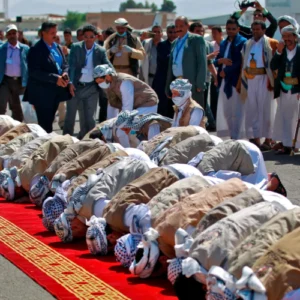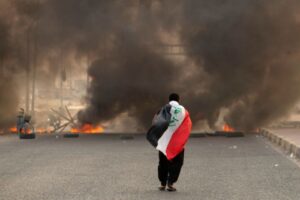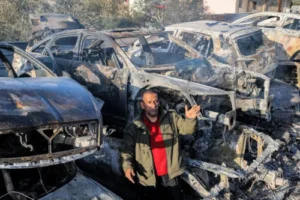
The National Interest Foundation Newsletter
Issue 184, March 24, 2023
Ramadan Mubarak and Welcome to our NIF Newsletter. In this week’s headlines: we look into the prisoner swap between the Houthis and the Saudis and what it could mean for the war in Yemen, examine the Iraq War 20 years later, and investigate the continued increase of violence against Palestinians by Israeli extremists.
Written by Breje Khan-Williams; Edited by Jacob Van Veldhuizen
Prisoner Swap in Yemen

The international community has celebrated this prisoner swap as a step towards an end to the war in Yemen. (Photo from AFP)
Prisoner Swap Between the Houthis and Saudis Could be a Catalyst to Finally End the Conflict in Yemen
The recent agreement between Saudi Arabia and the Houthis to swap 880 detainees is a positive sign of progress toward peace in Yemen. The exchange of prisoners has been a long-standing issue in the conflict, with both sides accusing the other of detaining thousands of their fighters and supporters. The recent agreement, which was reached after negotiations mediated by the UN, represents a step towards building trust and confidence between the opposing sides. The exchange is a significant development, as it is one of the largest swaps of prisoners since the start of the conflict. According to the agreement, the Houthis will release 181 prisoners, including 15 Saudis and three Sudanese, in exchange for 706 government-held prisoners. The exchange is expected to take place within three weeks, and the International Committee of the Red Cross (ICRC) will be involved in overseeing the process.
The exchange of prisoners is a crucial confidence-building measure in any conflict. It allows both sides to show their commitment to finding a peaceful solution and helps build trust between the opposing parties. In Yemen, the exchange of prisoners has been a longstanding issue, with both sides holding a significant number of prisoners. The recent agreement represents a significant step towards resolving this issue and building confidence between the opposing sides. The war has been raging for eight years and has left more than 20 million people in need of humanitarian relief. The conflict has caused a significant humanitarian crisis, with millions of people suffering from malnutrition, disease, and displacement. The recent agreement, along with other events, continues to provide hope that the conflict may finally be coming to an end. UN Special Envoy Hans Grundberg has been actively involved in diplomatic efforts to end the conflict. He has met with the governments of Iran and Saudi Arabia to discuss ways to reach a settlement on the war in Yemen. This recent prisoner swap is an important step forward in these efforts, and there is optimism that it will expedite the process. The Chinese-brokered restoration of relations between Iran and Saudi Arabia this month has also aided attempts to resolve the conflict. The two countries have been bitter rivals for decades, and their rivalry has played a significant role in the conflict in Yemen. The recent agreement is a sign that the two countries are willing to work together to find a peaceful solution or at the very least de-escalate the conflict. The exchange of prisoners is certainly a step in the right direction toward this end. The parties to the Stockholm Agreement, signed in 2018 by countries and groups involved in the conflict in Yemen, committed to free everyone imprisoned in connection with the war, including prisoners, detainees, missing persons, those who had been unlawfully arrested or taken hostage, and anyone who was under house arrest, “without any exceptions or restrictions.” However, progress has been slow, and more needs to be done to ensure that all prisoners are released. It is hoped that this exchange will pave the way for more significant exchanges in the future and contribute to ending the conflict in Yemen.
Furthermore, the recent agreement between Saudi Arabia and the Houthis to swap 880 detainees represents a significant breakthrough in the efforts to end the conflict in Yemen. This exchange of prisoners is critical to building trust and confidence between the opposing parties, which is essential in any peace process. Agreeing on negotiated deals requires a semblance of trust to lead to a comprehensive resolution to the conflict properly. This agreement provides hope that the warring sides are willing to take constructive steps toward finding a peaceful resolution to the conflict. While this exchange of prisoners is not the ultimate solution to the conflict, it is a positive sign. All parties must continue to work towards finding a peaceful solution to end the suffering of the Yemeni people. Looking beyond the end of the conflict is also important. The release of prisoners, including political prisoners, can contribute to creating a more conducive environment for political dialogue and engagement. It is hoped that this release of prisoners will contribute to building the foundations for a more democratic and stable Yemen. The release of prisoners can allow families to be reunited and provide some relief to those who have been affected by the conflict. It is hoped that this agreement will contribute to the overall efforts to address the humanitarian crisis in Yemen.
The recent agreement between Saudi Arabia and the Houthis to swap prisoners is a positive development in the efforts to end the conflict in Yemen. It provides hope that the warring sides are willing to take constructive steps toward finding a peaceful resolution to the conflict. The exchange of prisoners can also contribute to upholding democracy and alleviating some of the humanitarian crises in the country. The pathway toward an end to the war in Yemen is beginning to appear more clearly, but it is still an extremely fragile process. All parties must continue to work towards finding a peaceful solution to end the suffering of the Yemeni people.
The U.S. Invasion of Iraq 20 Years Later

The U.S. invasion of Iraq caused the deaths of hundreds of thousands of people. (Photo from AFP)
20th Anniversary of the U.S. Invasion of Iraq
March 20, 2023, marked the 20th anniversary of the start of one of the most controversial wars in modern history. In 2003, the United States launched a ground invasion of Iraq with the stated goal of overthrowing President Saddam Hussein and eliminating any suspected weapons of mass destruction (WMD) in the country. However, as the world now knows, US forces never discovered any WMD, and the nation of Iraq remains in a state of turmoil and instability. The war’s unjustness, the mistakes made before, during, and after the conflict, and the global impacts it has had over the past two decades continue to be debated and analyzed by scholars, policymakers, and the public alike. Despite the apprehension, prosecution, and execution of Saddam Hussein, Iraq still suffers from economic ruin, political unrest, and interference from both Iranian and American interests. This article will explore how and why America invaded Iraq, the unjustness of the invasion, the mistakes that were made before, during, and after the war, the current state of Iraq, and the global impacts it has had 20 years later. The case for war in Iraq was built years before the actual invasion, with US politicians and ideological leaders laying the groundwork for the occupation of the oil-rich nation. The push for Saddam’s overthrow began with President George H.W. Bush’s declaration to impose “liberal democracy” in Iraq after Saddam invaded Kuwait in 1990. This declaration opened the door for US neoconservative politicians to push for regime change, and the events of 9/11 provided a pretext for the US to act on these ideological goals. The demands for Saddam’s ouster made by Iraqi exiles living in the West also played a significant role. The result was a catastrophic war that led to the deaths of over 200,000 Iraqi civilians and 4,500 American soldiers, however, these numbers are disputed. An estimate by Brown University puts the number of deaths directly related to the conflict at 280,771-315,190. It is estimated to have cost the United States nearly $2 trillion.
The invasion of Iraq in 2003 saw US, British, and coalition forces swiftly decimate the Iraqi military, driving Saddam Hussein from power and capturing Baghdad just three weeks later. The toppling of a statue of Saddam Hussein in Firdos Square became an iconic moment, symbolizing US triumph and receiving global media attention. President George W. Bush even declared “mission complete” on May 1, 2003, from the deck of the USS Abraham Lincoln. However, the lawlessness that followed was downplayed by the American government, despite swiftly spreading throughout the nation and demonstrating the inability of US forces to restore order. The fall of Baghdad marked a significant moment in the Iraq War, but it was only the beginning of a long and tragic conflict that would shape the region for years to come.
“Weapons of Mass Destruction.” These four words will forever be associated with one of the greatest blunders in US foreign policy. The Bush administration’s claims that Iraq possessed chemical, biological, and nuclear weapons were proven baseless after Saddam Hussein’s capture in 2003. An investigation in 2005 revealed that American intelligence on Iraqi weapons was wholly inaccurate, and no evidence existed to support the allegations of defectors and members of the Iraqi National Congress. The lives of hundreds of thousands of people were lost in a war that should never have been fought. The lack of accountability for the faulty intelligence and the catastrophic consequence of the war serves as a stark reminder of the importance of truth and transparency in government decision-making. The Iraq Governing Council (IGC), the nation’s first post-2003 executive body, was selected through the muhasasa system, a sectarian quota system designed to ensure proportional government representation among the Shia, Sunni, and Kurdish communities. However, this system reinforced sectarian divisions, exacerbating the sectarian violence that still echoes throughout Iraq and the region today. Nouri al-Maliki, Iraq’s first prime minister, had strong ties to Iran and connections to armed groups, and his authoritarian and sectarian regime ruled for years. The failure of succeeding governments to reach an understanding with the Sunni majority, as well as corrupt and incompetent governmental institutions, fueled the emergence of sectarian violence across the nation. While Shia uprisings grew in the south, Sunni uprisings erupted in Anbar and Fallujah, with some arguing that a harsh security response in Sunni communities only served to radicalize them further. Ultimately, the lack of security in the region following the withdrawal of US soldiers in 2011 allowed ISIL to strengthen its hold and establish a so-called “caliphate” over large portions of the nation.
The aftermath of the Iraq War has left the nation in a state of turmoil and instability. Despite efforts to establish a democratic government through elections, sectarian violence, and political corruption have hindered progress. The recent protests in 2019 and 2020 showed that the Iraqi people have grown tired of the status quo and are demanding change. However, the government in power today was formed by a coalition with less than 15% of the vote, and many Iraqis feel that their voices are not being heard. As a result, some have turned to leaders who have a history of brutality and violence, such as Shia leader al-Sadr. The situation in Iraq highlights the harsh reality that the invasion has had long-lasting and far-reaching effects that continue to impact the nation and the region.
The 20th anniversary of the Iraq War marks a somber moment in modern history. The war, which was built on ideological goals and faulty intelligence, resulted in catastrophic consequences that are still felt today. The US-led invasion of Iraq toppled Saddam Hussein’s regime but left the nation in a state of turmoil and instability. The lack of accountability for the faulty intelligence and the devastating consequence of the war serves as a reminder of the importance of transparency and truth in government decision-making. The disbandment of the Iraqi army and intelligence agencies, and the exclusion of the long-reigning Baath Party from forming a new government, created a security and governance vacuum that caused havoc for years to come. The post-Saddam Iraqi government’s sectarian quota system only reinforced divisions and fueled sectarian violence across the nation. It is time for the United States and the international community to recognize their role in the current state of Iraq and work towards finding solutions that prioritize the needs and desires of the Iraqi people. Only then can Iraq move towards a stable and prosperous future.
Israeli Extremist Violence Continues

The intersection of Ramadan, Easter, and Passover has caused concerns about increased violence in the occupied Palestinian areas. (Photo from AFP)
Israeli Violence Against Palestinians Escalates Despite Agreement
The recent agreement made between Israel and the Palestinian Authority to “curb and fight violence” and partially halt Israeli settlement development ahead of a critical holiday season, marks a significant development in the ongoing conflict between the two parties. The agreement was facilitated by regional allies Egypt and Jordan, as well as the United States, and represented a breakthrough, at least in language. However, carrying out the promises made in the agreement is likely to prove difficult, given the increasingly inflammatory remarks and actions by Israeli extremists. The Israeli commitments to halt unilateral acts, including putting a stop to discussions about building new settlements for four months and plans to formally recognize illegal settlement outposts for six months, were mostly figurative. There were no imminent intentions to authorize more buildings since Israel just approved the construction of thousands of new settlement houses. However, even mentioning a slowdown in settlement activity runs the danger of sparking a reaction from settler leaders and sympathizers who make up the majority of Israel’s new coalition government. This government recently revoked a law that prevented settlers from returning to previously abandoned settlements. There have been mentions that the parties had reiterated their determination to de-escalate the situation and stop future bloodshed, including developing a mechanism to control and oppose violence, provocation, and provocative statements and acts.
Previous attempts to reach some type of agreement ended when violence broke out during a similar summit that took place in Jordan last month, leading to the abrupt abandonment of the conference. The upcoming period is problematic, as the religious holidays of Ramadan, Passover, and Easter all coincide. This has historically led to a significant influx of Jewish and Muslim worshippers into Jerusalem’s Old City, the conflict’s emotional center and a hotbed of violence, heightening tensions. Conflicts there in 2021 played a role in starting a conflict between Israel and Hamas, which controls the Gaza Strip, which turned into an 11-day war. Jews are also anticipated in large numbers to visit the Al-Aqsa Mosque, a significant Islamic holy site known to Jews as the Temple Mount. The Palestinians consider this as provocative behavior. The recent clashes between Israel and the Palestinians in the West Bank and East Jerusalem have also been among the deadliest in recent memory. The Israeli raids in the West Bank have already killed 85 Palestinians this year. 14 Israelis have also been killed in violence related to the conflict.
In addition to the inflammatory remarks and actions by Israeli extremists mentioned earlier, recent comments made by Bezalel Smotrich, Israel’s finance minister, demanding that the Palestinian village of Hawara be “erased,” have sparked international outrage. He has also recently made a speech in which he denies the very existence of the Palestinian people. A recent reversal of legislation also now enables Israelis to return to abandoned illegal settlements further complicating the situation and raising questions about Israel’s commitment to the recent agreement made with the Palestinian Authority. The Israeli settlements in the West Bank and East Jerusalem are considered illegal under international law, and the recent legislation reversal could be seen as a deliberate attempt to undermine the agreement and provoke the Palestinians.
The settlement issue is one of the major obstacles to peace in the region, with the Palestinians demanding a halt to settlement activities before resuming any talks with Israel. Hardline proponents of the settlement movement are in control of the Israeli government, which raises concerns about the country’s commitment to the peace process. The recent comments by Bezalel Smotrich, along with other high-level Israeli government officials, highlight the extremist views that have gained a foothold in Israeli politics.
In light of these developments, it is essential to have a sustained effort toward dialogue and reconciliation to achieve lasting peace in the region. The ongoing conflict between Israel and Palestine is complex and deeply rooted, with decades of unresolved issues contributing to the current situation. While the recent agreement made between Israel and the Palestinian Authority could be a positive step toward peace, there are significant obstacles that need to be overcome. Israel must honor the commitments made in the agreement and take concrete steps towards de-escalation, including implementing measures to stop violence and halt settlement activities. The international community must also play a role in supporting this process and ensuring that the humanitarian crisis in Palestine is addressed.
